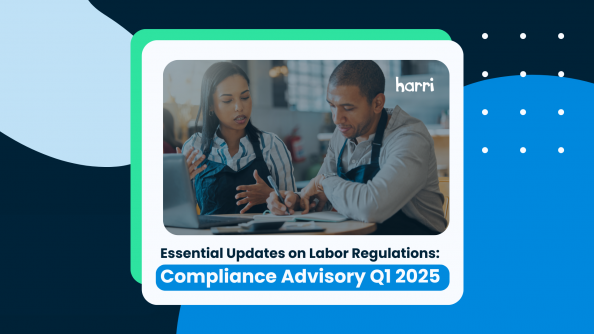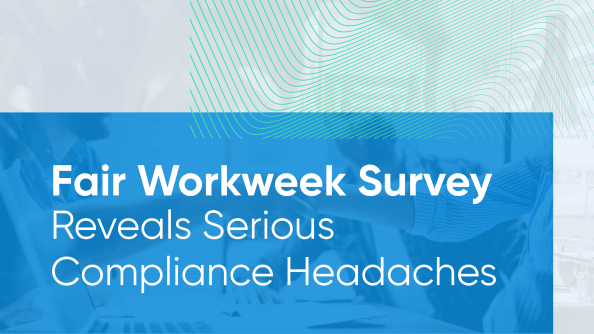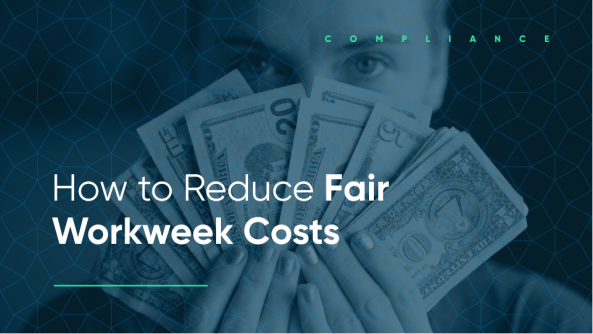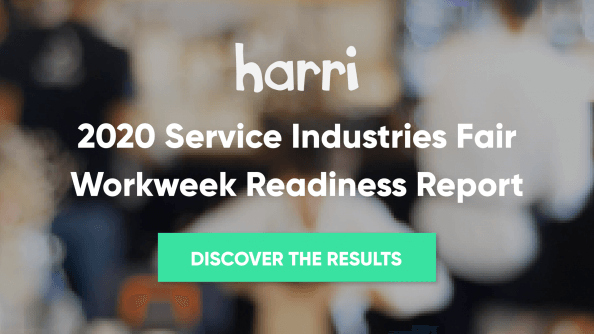Explained: Chicago Fair Workweek Regulations
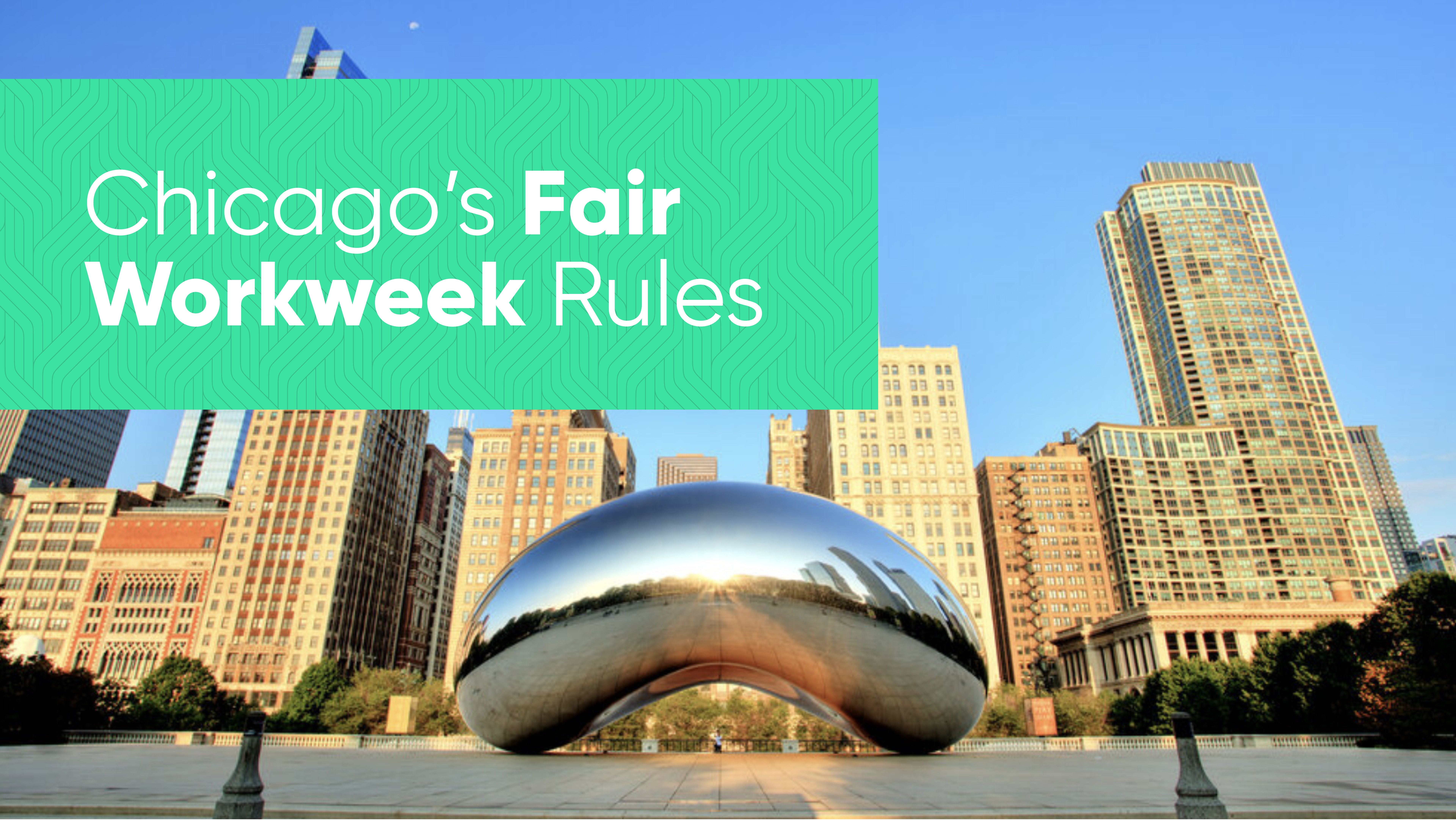
- By Harri Insider Team | May 13, 2021
Chicago Fair Workweek was passed July 2019, and it’s resulted in operational disruptions and compliance headaches for hospitality businesses ever since. Fair Workweek predictive scheduling laws aim to protect hourly workers from unfair scheduling practices and create a more predictable work environment, but these laws are incredibly complex to navigate.
What happens if a business fails to comply with Fair Workweek? The rules are complex and fines for violations are heavy. The Chicago City Council created a new department, The Office of Labor Standards, to “proactively investigate employers it believes could be violating labor laws.”
As a result, many operators have assembled dedicated finance teams to identify potential Fair Workweek violations and ensure compliance, but this approach deals with the symptoms of the problem rather than the cause.
Below, we cover a full list of Chicago Fair Workweek requirements as well as how hospitality businesses can take a tech-driven approach to compliance that results in labor efficient operations and long-term cost savings.
Who is covered under Chicago Fair Workweek?
Chicago Fair Workweek applies to all businesses with at least 100 employees globally (or 250 employees and 30 locations globally for restaurants) that fall under the following industries:
- Building services
- Healthcare
- Hotels
- Manufacturing
- Restaurants
- Retail
- Warehouse services
Employees that earn less than $26/hr are covered under Chicago Fair Workweek.
Chicago Fair Workweek requirements
Hospitality businesses must comply with the following labor, wage, and scheduling requirements in order to be in full compliance with Chicago Fair Workweek.
Advanced notice for scheduling
Chicago Fair Workweek requires managers to provide employees with work schedules at least 10 days in advance (14 days by 2022). This rule was put into place to protect employees from last-minute schedule changes.
If changes are made outside the 10-day window, including changes to on-call shifts, affected employees are entitled to premium payments. Employees also have the right to deny unscheduled shifts without retaliation.
Right To Rest periods
Right to Rest periods were built into Chicago Fair Workweek to protect employees from working “clopening” shifts.
Hospitality business owners must give employees at least a 10-hour rest period in between two shifts. This includes less than 10 hours after the end of the previous day’s shift AND during the 10 hours following the end of a shift that spanned two days.
Employees that agree to work clopening shifts in writing hours must be compensated 1.25x their regular rate of pay for any hours worked less than 10 hours following the end of a previous shift. They also have the right to deny these shifts without retaliation.
Predictability pay for schedule changes
As noted earlier, Chicago Fair Workweek requires managers to pay employees premium payments for last-minute changes to posted schedules. Premium payments are made to discourage operators from making too many changes to employee schedules while also rewarding employees for being flexible with changes.
Shift is changed but the number of shift hours stays the same
Pay employees one hour of predictability pay at their current pay rate.
Hours are added to a shift
Pay employees one hour of predictability pay at their current pay rate.
Hours are subtracted from a shift
- With more than 24-hour notice: Pay employees one hour of predictability pay at their current pay rate
- With less than 24-hour notice: Pay employees 1.5x their current pay rate for any scheduled hours that are subtracted
Good faith estimate of expected working hours
Good faith estimates aim to give new employees an approximate understanding of their schedules and expected work hours so they can plan their lives outside of work.
Good faith estimates must include:
- The projected days and hours for the first 90 days of employment
- Whether they are expected to work on-call or not
- Days and times (or shifts) that the employee is expected to work regularly or times they are not expected to work
If an employee’s schedule undergoes significant changes over an extended period of time, the employer must update their good faith estimate to reflect new scheduling expectations. Employees may request that the employer modify the estimated work schedule without retaliation, but implementing their feedback isn’t required.
Access to hours for existing employees
Chicago Fair Workweek requires that newly available shifts are prioritized to existing employees.
Employers must offer additional hours of work to existing employees before hiring new employees to cover the shift. These open shifts must be posted in writing at least three days before the shift start period, unless a shorter posting period is required (such as last-minute call-outs).
New shift notices must include:
- The total hours of work being offered
- The schedule of available shifts
- If those shifts will occur at the same time each week
- Shift length
- The process that employees must undergo to request picking up these new shifts
- The criteria the employer will use for the distribution of the shifts.
Existing employees are not required to take on new open shifts.
Exceptions to Chicago Fair Workweek
Chicago Fair Workweek does allow for some exceptions that provide flexibility for operations maintaining compliance.
Employers do not need to pay premium payments to employees if:
- Employees request shift changes in writing, including sick days
- Employees initiate schedule changes on their own, such as an employee-to-employee shift swap
- The employer subtracts employee shift hours for disciplinary reasons
- Banquet events or ticketed events are scheduled, rescheduled, postponed, or canceled for reasons outside of the employer’s control
- Hours are cut due to reasons outside of the business’ control, such as government mandates, severe weather, natural disasters, threats to property, etc.
HCM tech to ensure compliance with Chicago Fair Workweek
Fair Workweek is difficult enough for busy managers to handle on their own, but don’t forget that it stacks with additional wage and labor laws at the federal and local levels. Chicago restaurants, hotels, and hospitality businesses need an all-in-one HCM platform built to handle the compliance requirements of Fair Workweek to ensure no violations slip through the cracks.
The crux of Fair Workweek requirements revolve around the employee schedule, making tech-driven scheduling compliance a must-have for Chicago hospitality businesses.
But compliance doesn’t always equal labor efficiency, which is why operators must choose an intelligent scheduling platform with built-in compliance rules. Built specifically for the nuances of the hospitality industry, Harri’s compliance-driven scheduling platform keeps Fair Workweek violations at the minimum while empowering managers to effectively schedule to fit staffing needs.
While hospitality schedules are hectic and expected to change, the more prepared your team is during the scheduling creation process, the smaller your risk of incurring advanced notice premium payments. Harri utilizes sales forecasting and demand-based scheduling to empower managers to know exactly what days, times, and shifts you’ll be most busy and allocate labor accordingly.
Position-based scheduling takes this a step further by creating Fair Workweek-complaint schedules that best utilize your team’s skills. Is your bar busier on rainy Thursday nights? Does outdoor dining see a decline between 3 and 5 pm? Harri combines this data, and more, to take the guessing out of labor efficiency.
If and when a schedule does need to change, Harri makes employee-driven shift swaps incredibly easy for both employees and team members. This allows critical labor gaps to be filled and gives employees additional scheduling flexibility, all without breaking Fair Workweek compliance.
Carefree compliance
While it’s easy to see the compliance cost-savings value here, a major reason why leading hospitality brands choose Harri to manage Fair Workweek compliance is because its intelligent scheduling platform takes the headache out of navigating complex labor laws.Restaurant managers are busy enough without dealing with compliance puzzles. Finding a solution that simplifies the Fair Workweek compliance empowers managers to focus on creating an amazing guest experience rather than memorizing legal requirements or worrying about last-minute premium payments — but we’ll touch on those in a bit.
Good faith documents made easy
Despite the fact that good faith estimates of employee hours are a critical Fair Workweek requirement, almost no scheduling platforms have the capability to generate compliant estimates.
Harri automatically generates good faith estimates for each new hire to create fully transparent work expectations. Once the estimate is created, it’s sent off to the employee during the onboarding process for approval before their first day of work to ensure compliance with Fair Workweek requirements.
And if an employee’s schedule begins to differ from their good faith estimate, Harri will alert managers that their GFE document must be updated to reflect their new schedule.
Fair Workweek non-compliance alerts and penalty audits
No matter how closely you follow Chicago Fair Workweek, there will come a time where you need to pay premium payments. Whether you’re calling in last-minute help to deal with an unexpected customer rush or scheduling a clopening shift to maintain optimal service outputs, schedule changes will happen. These realities are even more true during hospitality’s labor shortage where workers are spread thin.
On the flip side, keeping track of every compliance detail is an impossible task when managers are overseeing multiple employees and locations. Many hospitality brands have taken to paying premiums to employees, even when a payment isn’t necessary, to ensure they aren’t hit with non-compliance fines. Not only is this unscalable, but it sets an unrealistic expectation of premium payments across service-level employees.
Harri notifies managers of all potential Fair Workweek violations before they happen to ensure full transparency with how your operations stack up against Chicago’s predictive scheduling requirements. This eliminates the possibility of accidental compliance breaches and empowers teams to effectively gauge when a premium payment is needed and when it isn’t.
Fair Workweek compliance alerts include:
- Right to rest violations
- Changes to already-posted schedules
- Warnings if an advanced notice schedule is due
- Confirmations for employee shift swaps
- Good faith estimate updates
And what if you need to track money spent on Fair Workweek premium payments? Harri allows you to pull a full audit of all Fair Workweek premiums, who they were paid to, how much, why the payment was issued, and which manager approved the payment.
Stay compliant with Chicago Fair Workweek using tech
Chicago Fair Workweek touches everything from scheduling to payroll, which means an all-in-one HCM platform is the best solution to ensure compliance while remaining labor efficient.
Harri was built by hospitality, for hospitality, to be a trusted partner in compliance. See how intelligent scheduling, detailed labor analytics, and more helps major hospitality brands navigate Fair Workweek and other labor laws.







